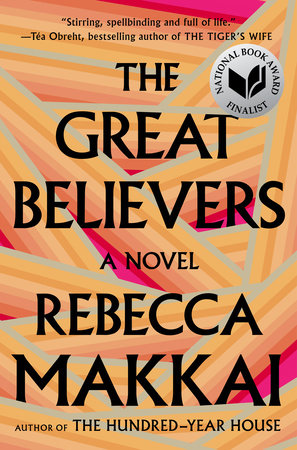Chris’s Pick
(March, 2019)
April, 2020
(Note: This is a review I wrote last year, then abandoned for another loved book—hard to keep up sometimes. In needing a review for this month, I reread this one and was struck by the similarities between what we are all going through now, and the AIDS crisis of the 1980’s. The loss and pain does not change…..)
The Great Believers
Rebecca Makkai
Viking Press
Rebecca Makkai’s novel begins in Chicago in 1985. Yale Tishman, the development director for a Chicago art gallery, is working to obtain a collection of remarkable 1920’s Parisian paintings from Nora, a ninety-year-old artist’s model who posed for multiple famous artists of the time.
Yet as Yale’s career begins to flourish, the AIDS epidemic grows around him. In tragic irony, the gay community that has embraced the sexual revolution is devastated by a disease that becomes apocalyptic. Yale’s friends are dying, and after his friend Nico’s funeral, the virus circles closer and closer to Yale himself.
“Everyone that spring just wandered. You’d find a friend in a cafe, and even if you’d hardly known them you’d run and kiss them, and you’d exchange news about who was dead. I don’t know how you could compare it to anything else.”
Soon the only person he has left is Fiona, Nico’s little sister.
Thirty years later, Fiona is in Paris tracking down her estranged daughter. While staying with an old friend, a photographer who documented the Chicago epidemic, she finds herself finally grappling with the devastating ways the AIDS crisis affected her life and her relationship with her daughter.
Yale and Fiona’s stories intertwine throughout the novel. Makkai thoughtfully explores the importance of memory and legacy, and the pain left with the survivors. The ninety-year old Nora’s story appears to be a footnote in the broader story at first. But her loss and her determination to have someone she loved remembered and recognized resonates throughout the novel.
Nora: “But when someone’s gone and you’re the primary keeper of his memory—letting go would be a kind of murder, wouldn’t it? I had so much love for him, even if it was a complicated love, and where is all that love supposed to go? He was gone, so it couldn’t change, it couldn’t turn to indifference. I was stuck with all that love.”
It is, in fact, Nora’s “Lost Generation” of the 1920’s (where so many young lives were lost to war and pneumonia), that produced the title of the book. Fitzgerald wrote in My Generation, “We were the great believers. I have never cared for any men as much as for those who felt the first springs of life when I did, and saw death ahead, and were reprieved — and who now walk the long stormy summer.”
Makkai’s multi-generational perspective is a fusion of past and present, public and personal, and reflects on how the world‘s tragedies and disasters affect lives we think we are living.
She was struck by the selfish thought that this was not fair to her. That she’d been in the middle of a different story, one that had nothing to do with this. She was a person who was finding her daughter, making things right with her daughter, and there was no room in that story for the idiocy of extreme religion, the violence of men she’d never met. Just as she’d been in the middle of a story about divorce when the towers fell in New York City, throwing everyone’s careful plans to shit. Just as she’d once been in a story about raising her own brother, growing up with her brother in the city on their own, making it in the world, when the virus and the indifference of greedy men had steamrolled through. She thought of Nora, whose art and love were interrupted by assassination and war…. tearing apart everything good that was ever built.”
Although the loss throughout the book is profound, the book keeps you up at night for just “one more chapter”. It is well written, and worth reading. This book was one of New York Times ten best novels of 2018.
